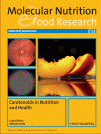
Gut Microbes
Scope & Guideline
Transforming Our Understanding of Gut Health
Introduction
Aims and Scopes
- Gut Microbiota and Health Interactions:
Research exploring how gut microbiota influence human health and disease states, including metabolic, neurological, and gastrointestinal disorders. - Microbiome Therapeutics:
Studies on the development and application of microbiome-based therapies, such as probiotics and fecal microbiota transplantation, aimed at restoring gut health. - Mechanisms of Microbial Action:
Investigations into the biochemical pathways and mechanisms through which gut microbes exert their effects on host physiology and pathology. - Diet-Microbiome Relationships:
Research examining how dietary components interact with gut microbiota and influence health outcomes, including studies on functional foods and dietary interventions. - Host-Microbiome Interactions:
Studies focused on the immune response and other host factors that modulate the gut microbiome composition and functionality. - Disease Associations:
Research linking specific gut microbiota profiles to various diseases, including inflammatory bowel disease, obesity, diabetes, and mental health disorders.
Trending and Emerging
- Microbiome and Mental Health:
Research is increasingly exploring the connections between gut microbiota and mental health conditions, such as anxiety and depression, highlighting the importance of the gut-brain axis. - Personalized Nutrition and Microbiome:
There is a growing interest in how personalized dietary interventions can modulate the gut microbiome to improve health outcomes, reflecting advances in precision medicine. - Microbial Metabolites in Disease Modulation:
Studies are increasingly focusing on the role of microbial metabolites, such as short-chain fatty acids, in regulating host immune responses and disease states. - Machine Learning in Microbiome Research:
The use of machine learning and advanced computational tools in analyzing microbiome data is on the rise, facilitating the discovery of novel associations and biomarkers. - Gut Microbiota in Aging:
Research is emerging on the role of the gut microbiome in aging and age-related diseases, emphasizing the potential for microbiome-targeted interventions in elderly populations. - Role of the Gut Virome:
There is an increasing focus on the gut virome and its interactions with the microbiome and host health, indicating a broader understanding of microbial ecosystems.
Declining or Waning
- Basic Taxonomy Studies:
Research focused solely on the taxonomic classification of gut microbes without exploring their functional roles or implications for health seems to be declining, reflecting a shift towards more applied research. - Traditional Probiotic Studies:
The emphasis on traditional probiotic strains without innovative modifications or new applications appears to be waning as researchers seek novel microbial therapies. - Single-Microbe Studies:
There is a noticeable decrease in studies that focus solely on individual microbial species, as the field moves towards understanding complex microbial communities and their interactions. - Correlative Studies without Mechanistic Insights:
The trend of publishing studies that only correlate gut microbiota with health outcomes without exploring underlying mechanisms is decreasing, as there is a greater demand for mechanistic understanding.
Similar Journals

EUROPEAN JOURNAL OF NUTRITION
Fostering Knowledge for a Nutritionally Informed WorldEuropean Journal of Nutrition, published by Springer Heidelberg, is a premier outlet for groundbreaking research in the field of nutrition and dietetics. Established in 1996 and set to continue its impactful legacy until at least 2024, this journal enjoys an impressive recognition, holding a Q1 category rank in both Medicine (miscellaneous) and Nutrition and Dietetics, with notable Scopus rankings that place it in the top 10% of its field. The journal facilitates open access options, enhancing the dissemination of knowledge across the globe. It serves as a vital platform for researchers, healthcare professionals, and students, promoting the exchange of innovative ideas and advancements in nutritional science that aim to improve health outcomes worldwide. With a commitment to quality and relevance, the European Journal of Nutrition continues to shape the future of nutrition research and practice.

AIMS Microbiology
Championing high-quality research in the realm of microbes.AIMS Microbiology, published by the American Institute of Mathematical Sciences (AIMS), is an esteemed Open Access journal dedicated to advancing the field of microbiology since its inception in 2015. With an ISSN of 2471-1888, the journal aims to disseminate high-quality research and innovative findings pertaining to both fundamental and applied microbiology, encompassing areas such as medical microbiology, immunology, and related life sciences. Recognized for its academic rigor, AIMS Microbiology has achieved a significant standing, evidenced by its current Q2 ranking in both Microbiology and Medical Microbiology categories, along with impressive percentile rankings within prestigious Scopus metrics. Based in the United States, the journal not only emphasizes accessibility and widespread dissemination of knowledge but also plays a crucial role in fostering collaboration among researchers and professionals in the microbiological sciences. By providing a platform for collaborative research and innovative ideas, AIMS Microbiology is poised to influence the future development and application of microbiological research, making it a valuable resource for students, researchers, and practitioners alike.

MOLECULAR NUTRITION & FOOD RESEARCH
Innovative Discoveries in Molecular Nutrition and Food Research.MOLECULAR NUTRITION & FOOD RESEARCH, published by Wiley, is a premier journal dedicated to the rapidly evolving field of food science and nutrition. With an impressive impact factor and a consistent position in the Q1 category for both Biotechnology and Food Science in 2023, this journal stands out as a leading platform for researchers, professionals, and students alike. The scope encompasses a comprehensive range of topics from molecular nutrition to innovative food research, with a focus on translating scientific insights into practical applications that enhance human health. As part of its commitment to accessibility, the journal offers open access options, allowing for wider dissemination and engagement with the academic community. Given its high ranking in Scopus—placing 42nd in Food Science and 62nd in Biotechnology—the journal plays a critical role in advancing knowledge and fostering collaboration in these essential fields. For over two decades, it has provided a vital forum for cutting-edge research, ensuring that each issue contributes significantly to the discourse around food and nutrition.

Malaysian Journal of Microbiology
Connecting Research and Practice in Applied MicrobiologyMalaysian Journal of Microbiology is a prestigious open-access journal dedicated to advancing the field of microbiology, published by the Malaysian Society for Microbiology. Since its inception in 2005, this journal has become an essential platform for researchers and practitioners, facilitating the dissemination of innovative studies in applied microbiology, biotechnology, and infectious diseases. Based in Penang, Malaysia, this journal not only focuses on local microbiological research but also positions itself within the broader global scientific community. Although currently placed in the Q4 category in several relevant fields—including Applied Microbiology and Biotechnology, Infectious Diseases, and Medical Microbiology according to the 2023 Scopus rankings—it plays a crucial role in encouraging novel research and fostering collaboration among scientists. The journal encourages submissions that contribute to the understanding of microbial processes, disease mechanisms, and novel biotechnological applications, thereby supporting the continuous growth of knowledge in microbiology. With open access since its launch, the Malaysian Journal of Microbiology ensures that all published works are freely available to the public, enhancing their visibility and impact within the scientific community.

Bioscience of Microbiota Food and Health
Innovating Research at the Crossroads of Food Science and HealthBioscience of Microbiota Food and Health, an esteemed journal published by BMFH PRESS, serves as a pivotal platform for interdisciplinary research in the expanding fields of applied microbiology, food science, and gastroenterology. Since its inception in 2014, the journal has facilitated a critical exchange of scientific knowledge, promoting advancements in our understanding of microbiota's role in human health and nutrition. With its impressive 2023 category quartile rankings—Q2 in Applied Microbiology and Biotechnology, Food Science, and Gastroenterology—it stands out among its peers, appealing to researchers, professionals, and students alike. The journal does not follow an open-access model, which underscores its exclusivity while maintaining rigorous peer-review standards. Based in Japan, it provides a global forum for innovative studies that advance the field and enhance public health outcomes. As the journal converges into its next decade, it continues to uphold its commitment to disseminating high-quality research that bridges the gap between microbiota, food, and human health.

Korean Journal of Gastroenterology
Advancing Knowledge in Gastrointestinal HealthKorean Journal of Gastroenterology (ISSN: 1598-9992, E-ISSN: 2233-6869), published by the Korean Society of Gastroenterology, has been a premier outlet for research and advancements in the field of gastroenterology since its inception in 1968. This open-access journal, based in South Korea, fosters a global dialogue on gastrointestinal health, embracing contributions from a diverse array of disciplines within medicine. It is currently ranked in the Q4 quartile for miscellaneous medicine and holds a Scopus rank of #323 out of 636 in general medicine, reflecting its commitment to publishing impactful research despite its relatively recent establishment in high-impact metrics. With a continuous publication timeline extending through to 2024, the journal aims to enhance understanding of gastrointestinal disorders and promote innovative treatments, making it an essential resource for researchers, clinicians, and students alike who seek to stay abreast of the latest developments and clinical applications in gastroenterology.

Microorganisms
Unveiling the mysteries of microbial life.Microorganisms is a leading open-access journal published by MDPI based in Switzerland, catering specifically to the rapidly evolving fields of microbiology and virology. Since its inception in 2013, the journal aims to foster the dissemination of high-quality research through its comprehensive and interdisciplinary platform, with a particular focus on both fundamental and applied microbiological sciences. Contributing to its esteemed reputation, Microorganisms holds a commendable Q2 ranking in the categories of Microbiology and Virology, as well as in Medical Microbiology, highlighting its significance in the academic community. With a consistent impact, evidenced by its rankings in Scopus—such as rank #25 in Virology and #56 in Microbiology—the journal serves as an invaluable resource for researchers, professionals, and students looking to stay at the forefront of microbiological research. As an open-access journal, Microorganisms ensures that vital research findings are readily available to a global audience, promoting collaboration and innovation in the study of microbial life and its implications for health and disease.

WORLD JOURNAL OF GASTROENTEROLOGY
Connecting researchers with groundbreaking findings.WORLD JOURNAL OF GASTROENTEROLOGY, published by BAISHIDENG PUBLISHING GROUP INC, stands at the forefront of gastrointestinal research, providing a critical platform for the dissemination of high-quality studies in the field. With an impressive impact factor reflected in its Q1 rankings in both Gastroenterology and Miscellaneous Medicine, this journal is recognized for its rigorous peer-review process and commitment to advancing knowledge and practices related to digestive health. Covering comprehensive scopes from clinical advancements to innovative therapies, the journal serves an essential role for researchers, clinicians, and students, enabling them to stay updated on the latest developments and findings from 1998 through 2024. The open access model facilitates broader accessibility, ensuring that groundbreaking research reaches a global audience. The journal's ranking within the top 15% of Scopus demonstrates its significant contribution to the academic community, making it a valuable resource for advancing the science of gastroenterology.

GUT
Advancing the Frontiers of Gastrointestinal ScienceGUT is a premier journal in the field of gastroenterology, published by the esteemed BMJ Publishing Group. With a rich history dating back to 1960 and an impressive convergence of research expected to continue through 2024, GUT has established itself as a cornerstone of academic discourse in the gastrointestinal sciences. The journal boasts a remarkable impact factor, positioning it in the Q1 category for gastroenterology with an outstanding rank of #3 out of 167 in its Scopus ranking, reflecting its 98th percentile status among peers. Although it does not currently offer open access options, GUT remains dedicated to disseminating high-quality research, reviews, and clinical studies that advance the understanding of digestive health. Published in the United Kingdom, GUT serves as an essential resource for researchers, clinicians, and students aiming to stay at the forefront of innovations and developments in the field.

Gut Pathogens
Championing Open Access to Transform Gut Health UnderstandingGut Pathogens, published by BMC in the United Kingdom, is a premier open-access journal focusing on the intersection of gut health and infectious diseases. With its impact firmly established since its inception in 2009, the journal has earned impressive rankings, including Q1 in renowned categories such as Gastroenterology, Infectious Diseases, Microbiology, and Parasitology, while maintaining a strong presence in Virology. The journal serves as a vital resource for researchers, professionals, and students interested in the intricate relationships between gut microbiota and pathogenic organisms, offering insights that drive advancements in treatment and prevention strategies. By providing unrestricted access to high-quality research, Gut Pathogens fosters a collaborative environment, encouraging the dissemination of knowledge and innovation within the field. The journal publishes original research, reviews, and case studies, all designed to address contemporary challenges in gut health, ultimately aiming to improve patient outcomes and public health worldwide.